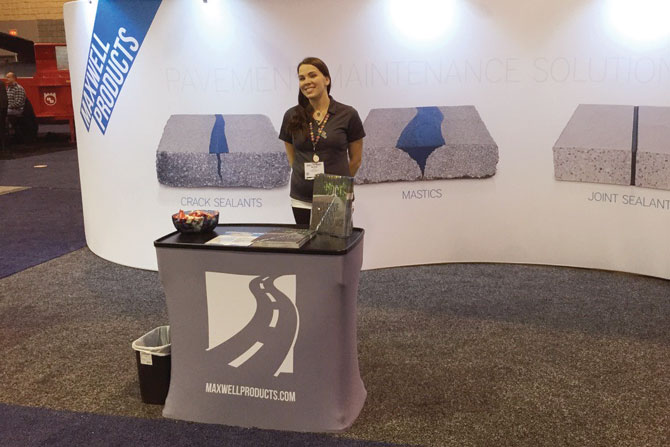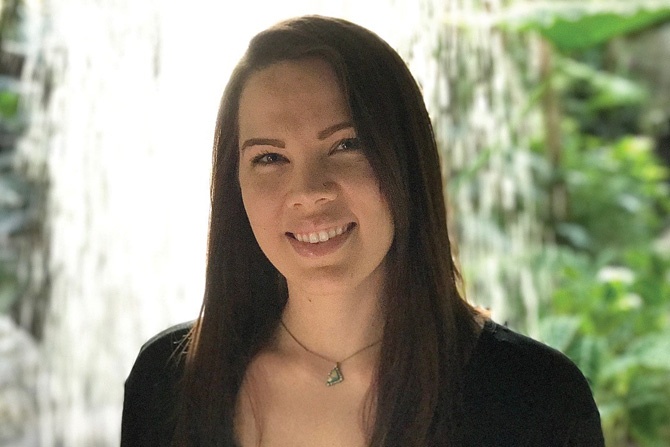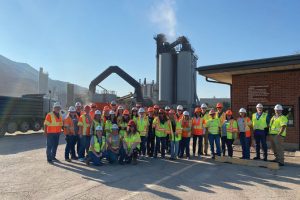Tell us how you got into the asphalt industry?
I originally came from the hospitality industry. At one point, I went with Brent Maxwell to a trade show as a spouse. When we got there, I asked if I could be in the booth. Brent couldn’t understand why I wanted to do that, but the group gave me a crash course in the material and everything we do. I loved everything about that experience. I talked to the contractors, and I learned more about Brent, Ken, Ted, and Del. They saw something special in my skill set, and Ken told me I could have an amazing place here, too.
Joining the business was a big shift for me, especially because I knew wonderful people on the hospitality side, too. My previous work experience involved a high expectation that I would provide amazing customer service, and I never thought I could have that outside the high end of hospitality. I had a narrow vision and thought I was limited. But Tom Cannon, my boss here, has nurtured my skill set and abilities. He is our sales manager, and he is a strong, supportive guy.
What is your educational background?
I graduated from high school, but my education after high school consisted of on-the-job training and experience in the hospitality industry. I worked at Little America and Grand America. You are held to an unusually high standard when you work in hospitality, and I learned a lot of what I do now.
I never thought I would leave the hospitality industry. When I made the jump, though, I was able to contribute immediately. I am grateful for what I learned.
Are there specific individuals who have had an impact on your career?
I dote on the Maxwells because they are incredible people. They test everything because they have their name on the box, and they want to provide the best service possible. They don’t skimp.
What is the most rewarding part of your career?
I am encouraged to learn, grow, and be social, and there is no limit to what I am allowed to accomplish. When you combine that with being in the asphalt industry and knowing we affect and support this country’s valuable transportation infrastructure, the results are really pretty spectacular. It gives me purpose.
What are some professional moments that make you proudest?
One of my proudest moments is being here at the start of the Utah branch of Women of Asphalt and working with the other women, such as Keri Dumont of UAPA, Nicole Shields of Barricade Services, Hailey Isaacson with Staker Parson Materials & Construction, and Stacey Kelly with Construction Material Recycling.
I love this industry. Many women can be a little intimidated because there’s a stereotype that girls don’t play with big machines. But it’s amazing over here in the asphalt industry. There’s potential to grow, and it isn’t limited by education. If you need training, you can get training. We are saying to women, “This is great and wonderful. Come hang out over here with us!” I am proud to be part of that.


Was there an “aha” moment in your career that defined you?
I love talking to people and helping them, and when I worked in hospitality, I provided a high level of service by putting together weddings and big events. But I thought I was also stuck wearing three-piece suits and wandering around hallways with English carpet.
Then I went to a trade show and found out that my specific skills are needed, valued, and encouraged. I have a home here, too. Now I can wear jeans and talk to a guy starting a crack seal company. There is room for what I love doing here, as well as what I can provide.
If you had to look back at your professional life, what three things have you learned that you would pass on to someone looking at a career in the asphalt business?
- Growth opportunities are endless within the industry. Companies value degrees, but they want to know what you have to offer, and they look at abilities, experience, and skillsets. You have no limits, even without a degree. I could continue to grow anywhere in this industry.
- This industry is vitally important. Transportation infrastructure and everything that involves, is a small piece of a bigger puzzle that keeps this country moving. It also makes it possible for people to drive back and forth to their loved ones.
- Your car will never smell good. Your car will always smell like asphalt if you are near a plant or a job site.
Let’s talk a bit about Maxwell Products, Inc. It’s a family company. You are now part of the Maxwell family, and you are very clearly proud of the company you work for and represent. The company was founded in 1975 by Ted and Delwyn Maxwell. They were schoolteachers in Southern Utah before that. Teaching school to asphalt paving is a leap. How did that happen?
Ted and Delwyn are insanely intelligent men who grew up on a farm near Glendale, which is so small it still doesn’t have a gas station. They are like two peas in one pod. They joke together, sing together, and they love expanding their minds.
The farm taught them how to work hard, and they became teachers because they loved learning new ideas and concepts. Ted taught at an elementary school in Orderville, and Delwyn taught in Ganado, Arizona, on a Navajo Nation reservation. He taught chemistry, math, and physics. He loves all three subjects.
Why did they decide to create a pavement maintenance business?
Ted and Del were always logging in the summer and sometimes in the winters to make ends meet. That work led to maintenance jobs. In between their other work, they saw an opportunity for growth if they started doing sealcoating and sealcoat manufacturing.
Delwyn left teaching and came back to Southern Utah full-time to do more sealcoat work. Ted helped Del after hours and in the summer. He also worked on funding. It was always a pretty good partnership. They worked hand in hand through everything.
They had an opportunity to open a seal coat plant in Salt Lake City, so Del moved up from southern Utah. As the plant started to grow, Ted moved to Centerville about a year later.
They saw a need for crack seal, and they licensed a formula from Arizona Refining Company for asphalt rubber, which is what crack sealant was back then. Ted and Del thought they could elevate the crack sealant and make a more effective material than asphalt and rubber, so they created some formulations and started tinkering with them. They were contracting part of the time and working on crack sealant the rest of the time. They would mix crack sealant in a kettle and then deliver it. The crack sealant wasn’t even packaged. It became more of a packaged item over time.
Why did they decide to go full-time with a pavement maintenance business and move to Salt Lake City?
Salt Lake City asked them to start manufacturing crack sealants. The company really started to grow from there. Ted and Del disliked the conflict of interest between contracting and manufacturing, so they decided to focus on manufacturing. They sold the machines and supplies they’d bought for contracting to M&M Asphalt Services.
Ted and Del are honest, hardworking, small-town Utah guys who never tell even the whitest of white lies. They want to do what is best for everybody, and they grew the company with handshakes and integrity. They use good, honest materials, and they listen to customers. People trust them and gravitate toward them.
Company ownership stayed in the family after Ted and Del retired. Ted’s son, Ken Maxwell, is the president. Brent Maxwell, my husband, is the marketing director, and he does the website and print work. I never expected to be part of the company, but now I am our sales support manager. That includes customer service. Tom Cannon, my boss here, has nurtured my skill set and abilities. He is our sales manager, and he is a strong, supportive guy.
Maxwell Products, Inc. has become a national company, and we are heavily involved in UAPA. We are represented in all 50 states, Canada, Mexico, and Australia.
Even though there are late-night crews, the asphalt industry also has trade shows and the Utah branch of Women of Asphalt. I am encouraged at Maxwell Products, Inc. to grow professionally and be more available for my children.
How has the pandemic affected Maxwell Products?
For us, it was business as usual, but we struggled to get the materials we needed, find trucks, and get the materials where they needed to go. Getting cardboard is still an interesting struggle, and we’ve had to deal with rising oil prices. Also, many municipalities have uncertain budgets. We kept going, dealt with supply chain issues, adapted, and provided whatever was necessary to keep the transportation infrastructure moving. I know many companies had to close, or people were furloughed. Many people working in hospitality were furloughed.
COVID-19 caused problems with the construction industry’s supply chain, but it also affected workers’ mental health. Statistically speaking, next to front-line workers, the construction industry has the highest rates of depression and addiction. We saw that even more after COVID-19 caused problems with the supply chain. Nothing stopped the workers, though; they just kept going. There is a sad satisfaction in that because I know the pandemic made their problems worse.
Many guys have a hard time admitting they have a problem, and they are often uncomfortable talking about it. Keri and Reed, and some of the Women of Asphalt, are very aware of this. If we can provide classes that acknowledge a problem, more people might get help.
What is the biggest impact of being a UAPA member? What makes it beneficial?
I could rant and rave about how much I love UAPA. It is such a great association. Every other association should take a page out of their book. UAPA involves its members and tries to make changes that are beneficial for the state. In addition to the obvious stuff, like networking and learning, sitting on the preservation and planning committees is my favorite part. They listen to me and make me feel heard and special.
Any last words?
I made my big career change seven years ago, and I have never looked back. I love what I am allowed to be here.
My husband and I were both married before, and we have a blended marriage with five children: Alexis and Gavin (both 19), Alec and Madison (both 16), and Devon (13). It looks like we have two sets of twins, but we don’t. We have a very busy household.
Working for a hotel is hard when you have young children. There is a lot of high pressure. You would think the asphalt industry would be less friendly than the hospitality industry, but the reverse is true, and I don’t think that is limited to Maxwell Products, Inc.
You can be successful at Maxwell Products, Inc. as a woman and a mother. It’s a breath of fresh air, and I would never give up what I have. The company helps me flourish. Even though there are late-night crews, the asphalt industry also has trade shows and the Utah branch of Women of Asphalt. I am encouraged at Maxwell Products, Inc. to grow professionally and be more available for my children. I don’t ever have to choose between my children and my job. If one of my children is sick, the people here do what they can to give me options, which helps me be a better mom. Also, I get to work with my handsome, amazing and supportive husband.
I am an optimistic person, but I’ve had a lot of ups and downs. Everybody deals with problems, and you can always use the hard times as a crutch, but I want to work harder and be better; I want to focus on happiness. Even bad days have joy in them.






